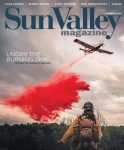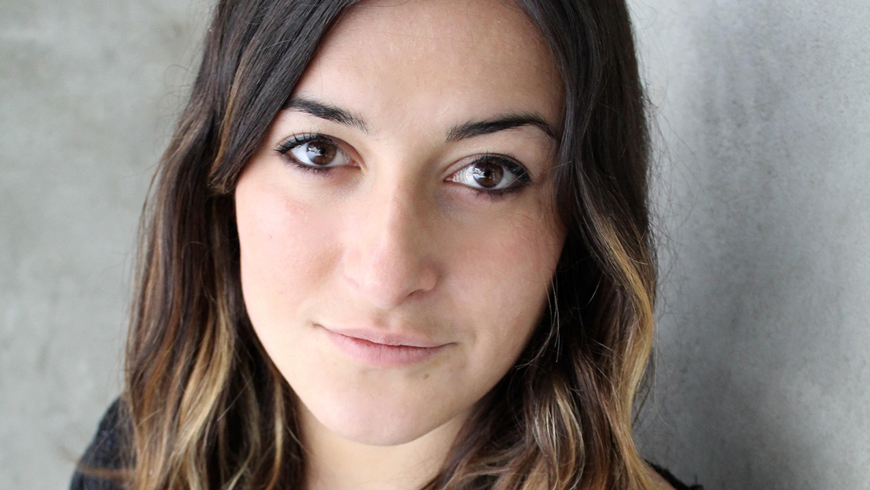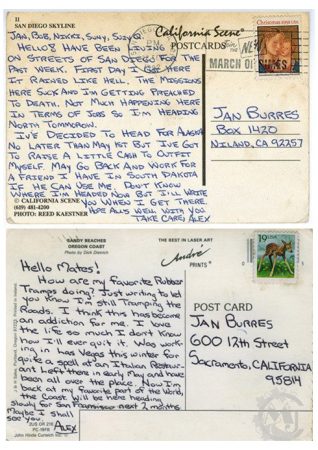High School: Community School
Project Title: Into the Wild … World of Playwriting
Post-Graduation Plans: Attending Rutgers Mason Gross School of the Arts
Below is a transcription of Anik Zarkos’ project presentation on her experience in playwriting, an adaptation of “Into the Wild,” for the stage.
“S.O.S. I NEED YOUR HELP. I AM INJURED, NEAR DEATH, AND TOO WEAK TO HIKE OUT OF HERE. I AM ALL ALONE, THIS IS NO JOKE. IN THE NAME OF GOD, PLEASE REMAIN TO SAVE ME. I AM OUT COLLECTING BERRIES CLOSE BY AND SHALL RETURN THIS EVENING. THANK YOU, CHRIS MCCANDLESS. AUGUST?”
About two years before Christopher McCandless’ body was found in an old abandoned bus on the outskirts of Fairbanks, Alaska, McCandless changed his name to “Alexander Supertramp” and set out on a cross-country adventure. He burned or donated the contents of his savings account, abandoned his beloved car, and navigated his way by foot, train, and canoe. He made connections along the way with hard-working Americans and fellow leather tramps. This trip culminated in McCandless’ long-sought and ultimately fatal “Alaskan adventure.”
Since his body was found in September 1992, McCandless’ story has infatuated and confounded many around the world. Why would a clean-cut college graduate from a well-to-do family completely cut ties with his loved ones and disappear without a trace?
The story was so captivating and confounding that it inspired the Jon Krakauer nonfiction book and Sean Penn’s screen adaptation, “Into the Wild.” I first encountered the story on the 11th grade fall trip to the Sawtooths. Sitting in my sleeping bag in a crowded room with my classmates, I felt like someone had punched me in the gut. Maybe it was the romantic montages of the winding roads. Maybe it was the warmth of Eddie Vedder and his guitar. Maybe it was just Emile Hirsch’s face. Whatever it was, it stuck with me. I devoured the book soon after that. Jon Krakauer’s narrative, coupled with his skilled placement of quotes, articulated the contents of my heart that I didn’t have the courage or conviction to express. I wasn’t alone in this, either. Within this school, valley, and beyond, there are countless humans who return to this story as a place of comfort, solace, or sorrow. This story is ageless. Throughout our lives, we can come home to it, and at each point, it will shift in its meaning or gravity, depending on our new experiences. Perhaps this is why I was terrified to begin writing, because, for many of us, it’s deeply personal.
I was terrified of misrepresenting the story and the people that I held so close. Christopher McCandless valued honesty above everything else. Because of his quest for truth, his relationship with his father fractured, and he rejected any institution that symbolized fallacy. To betray this value would make me feel like a fraud. It would make me feel as though I was looking in on this story from afar. In reality, I wanted this story to embrace me as much as I had it.
So, I began to write.
It took me a second. For a few days I sat down at Maude’s, looked at my computer, and tried to will a play out. I began with rereading. I skimmed through with a pen in my hand, underlining, bubbling, or circling pretty much everything because pretty much everything felt important. I dug out a timeline of events and assimilated and organized a plethora of journal entries and letters. I’ve never been one for outlining; I usually just start writing and outline later. So that’s what I did. I started with scene one. All I wrote was stage directions because I was terrified of dialogue. I knew what a burden bad dialogue was on an actor, and I didn’t want to be a hypocrite. So, I just avoided it altogether at first. I added some dialogue eventually. Much of the dialogue is composed of snippets of journal entries or letters that have been molded to support the structure of my retelling. There was a lot of talking to myself. I figure you’ve got to put the words in your own mouth and chew on them before you force them into someone else’s.
I moved on slowly. Most of my scenes were written down as “Scene Question Mark” because I didn’t quite know where to place them or how to transition from scene to scene in a way that wouldn’t give an audience member whiplash.
Then it was about directing and recording music. I’m an exuberant director. I tend to shout out when I don’t like something, which maybe isn’t good, and I like to cry when I love something. Then recording. Recording music is easy when you have wonderfully talented friends. Recording music is hard when you have friends that have no idea how to use GarageBand. Luckily for me, I had both, all in one Annabelle Lewis. The music turned out beautifully, though, and I’m so excited for you all to hear what we’ve cooked up.
This process in its entirety has helped me discover new passions within the craft that I had already come to love. Directing and writing pieces of theater have always been practices that I’ve admired from afar but have been too afraid to participate in myself. My dad has always told me to write. I brushed him off. “Daaaad, I wanna ACT.”
I’ve come to realize in the past few months that theater is a difficult career to pursue. It’s hard for someone else to be in charge of when you can or cannot participate in the thing you love most. And what I’ve come to realize is that a great way around that is writing. It is creating without needing permission. It is doing something for the sake of artistic growth and not necessarily professional or financial gain. To be able to spend so much time with a story that I love, in the place that I love, participating in a craft that I truly do love, I feel like I can take ownership over my artistic expression. This is also why I felt a little self-conscious of my project at first, though. I felt like maybe it was too selfish, or it wasn’t helping the world enough. Maybe I should have done, “Anik single-handedly revives the world’s coral reefs!”
However, I realized that art helps the world out in a ton of different little and not-so-little ways. Art is a pure expression of the human experience. It allows us to grieve, to heal, to laugh, to feel something so personal and yet so much bigger than all of us. And by giving ourselves over to it, we create generous and empathetic individuals, and with enough of those, the world really does start to heal.
Below is the last scene of the play Zarkos created from “Into the Wild.”
Chris is alone. He is hungry and tired and lonely. He sings Angel from Montgomery slowly. He can’t remember all of the words. There is a knock on the door. Chris doesn’t believe it. Knock again. Is it in his head? Knock again. Chris gets up, straightens the room. He breathes and opens the door. Walt McCandless stands there. They look at one another.
CHRIS. Dad.
WALT. Chris.
Chris smiles. This is the first time he’s heard his name since he set out.
WALT. Or should I say Alexander Supertramp? Huh? Y’know, master of his destiny.
CHRIS. Dad, don’t do this.
WALT. Everybody take a good look at Alexander Supertramp. Don’t you admire his courage?
Walt backs Chris into the bus.
WALT. Don’t you admire the way he abandoned his family? Deserted his little sister. His mother woke up in tears every night – Isn’t he brave?
CHRIS. DAD
WALT. You have no idea what you’ve done.
CHRIS. What I’ve done? Do you have any idea, any clue in the goddamn world, what you have done? You turned our lives into lies, Dad. I’m surprised you came to get me, your little bastard child, Dad! You’re a liar, Walt! Don’t tell me what I did was wrong. Don’t tell me that I shouldn’t have done this. Don’t you tell me a [damn] thing! Because you made me into this.
Walt looks at Chris.
WALT. (beat) How could a kid with so much compassion cause so much pain?
CHRIS. (beat) I didn’t mean to hurt you. I didn’t want to hurt any of you.
WALT. You’re so loved, Chris. You are so loved. Why doesn’t that make any sense to you? We needed you, and you left. And that doesn’t make any sense to a parent, y’know? Why doesn’t my kid need me? Why don’t they need me back?
CHRIS. I do need you, Dad. Look at me. (Chris looks around at the empty rice bags, at the bus.) Look at me. I need you. (Chris breaks down.) I need you.
Walt runs to Chris. They embrace. Chris continues to break down. Finally, Chris weakens, and Walt carries him to the bed as if he were a little boy again, tucks him in. Walt watches his boy sleep. Suddenly, Ron appears in the doorway.
RON. He loved you. He loved all of you. Deeply. The boy had a lot of rage, but it masked a whole lotta love.
WALT. Funny way of showing it, huh?
RON. I don’t think he knew how to show you, don’t know if he ever learned.
Walt thinks about this. About his own actions.
RON. I’ll tell you this, my friend, Alex, er, Chris, found a lot of forgiveness deep down within himself and I urge you to do the same. Because when you forgive, you love, and when you love. (Ron smiles to himself).
Walt looks up at Ron. Ron smiles at him. Pulls a couple of books off of the desk and taps on it with a wink. He disappears. Ron, confused, shoots up to look at the desk. The words “HAPPINESS IS ONLY REAL WHEN SHARED—CHRIS MCCANDLESS” are revealed. Spot on, Walt. He feels the light on his face. After a moment, Tracy enters, also in a spot. She sings.
MUSIC CUE. When I walk beside her, I am a better man.
One by one, all of the people that Chris has come to love enter in their own pools of light. They join in singing and finish “Hard Sun” together. As the song comes to a close, their spots fade as a spot slowly comes up on Chris. He rolls onto his back. He is weak, but content.
CHRIS. God’s light shines on you.
Chris smiles. The spot slowly fades. Blackout.





